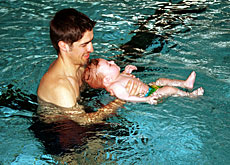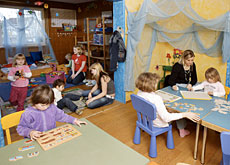Switzerland fails childcare test

The United Nations Children's Fund (Unicef) has given Switzerland very low marks for its efforts to support families with young children.
Switzerland only fulfilled the minimum requirements in three of ten indicators included in the Unicef report, the Childcare Transition, issued on Thursday.
The fact that Switzerland finished in the bottom quarter of the 25 countries surveyed is sobering for a country consistently ranking among the world’s richest and with one of the highest standards of living.
The state spends less than a third of the prescribed minimum (one per cent of gross domestic product) on childcare support. Only two Organisation for Economic Co-operation and Development (OECD) countries provide less (Ireland and South Korea).
This is reflected in the fact that while nearly 60 per cent of Swiss women with children under the age of three work (around the OECD average), they are last on the list with less than five per cent of their infants enrolled in licensed childcare.
The figure rises to around 40 per cent for three- to six-year-olds but is still not enough to lift the Swiss from the bottom of the table.
The Swiss children who are cared for outside of the home do not get the kind of attention they should receive, according to the authors, who found that less than 50 per cent of the minders have a post-secondary education.
Question of quality
Elsbeth Müller, head of Unicef Switzerland, says this is one area where Switzerland needs to make improvements. The priority, she says, is not only to offer extensive services but to ensure they are of a high quality and available to all, including low-income families where both parents have to work to make ends meet.
“Switzerland has ratified the Convention on the Rights of the Child and is therefore obliged to respect the principle of non-discrimination,” Müller said.
For child psychologist Leo Barblan, Switzerland’s federal political system – where the cantons are responsible for educational issues – is largely to blame.
“The system is not always equitable,” Barblan, a member of the World Organization for Early Childhood Education, told swissinfo.
He explained that early education services were often not part of the public domain, and lamented the lack of cooperation between these services and specialists such as paediatricians and speech therapists so important for identifying learning problems.
Maternity leave
Paid maternity leave and health care also figured in Unicef’s report.
In Switzerland new mothers are not given enough time off (16 weeks), it said, and the country is less flexible than other OECD states when it comes to offering parents the chance to share the responsibility of staying home to raise their offspring.
Unicef also found that poor families and families with a migration background often do not have sufficient access to health care services for their newborns.
Switzerland scored well in three categories. The first two are proof that – when they exist – external child-minding services are up to scratch: eight out of ten childcare staff are specially trained for their work and there is at least one staff member for every 15 children. Thirdly, the child poverty rate in the country is less than ten per cent.
Advance or setback?
The authors of the report, compiled by Unicef’s Innocenti Research Centre in Florence, Italy, argue that “the trend towards out-of-home childcare is likely to represent either a significant advance or a significant setback for today’s children and tomorrow’s world”.
They say the public and policymakers are challenged to respond to this trend, especially since there is a greater understanding today of “what is happening to the human brain in the early months and years of life”.
Separate studies conducted in the United States, France and Sweden since the early 1990s have all concluded that childhood education and care was associated with an improvement in academic performance in later years.
swissinfo, Dale Bechtel
Unicef benchmarks:
Parental leave of one year at 50% of salary
National plan with priority for disadvantaged children
Subsidised and regulated childcare services for 25% of children under three
Subsidised and accredited early education services for 80% of four-year-olds
80% of all childcare staff trained
50% of staff in accredited early education services tertiary educated with relevant qualification
Minimum staff-to-children ratio of 1:15 in pre-school education
1% of GDP spent on early childhood services
Child poverty rate less than 10%
Near-universal outreach of essential child health services
Report Card 8 – the Childcare Transition is Unicef’s first attempt to evaluate and compare early childhood services in the 25 OECD countries in which data was collected.
Unicef says the proposed benchmarks are internationally applicable, describing them as a “set of minimum standards for protecting the rights of children in their most vulnerable and formative years”.
The Report Card compares each country’s early childhood services under four headings: a national commitment to early childhood services; access and inclusiveness; quality of early childcare and education; and the social and economic context into which the child is born.

In compliance with the JTI standards
More: SWI swissinfo.ch certified by the Journalism Trust Initiative












You can find an overview of ongoing debates with our journalists here . Please join us!
If you want to start a conversation about a topic raised in this article or want to report factual errors, email us at english@swissinfo.ch.